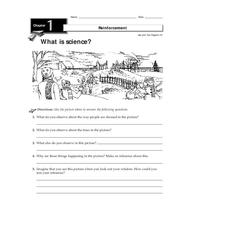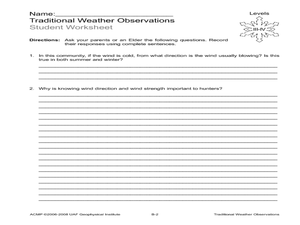Towson University
Looking Into Lactase: Guided Inquiry
Milk does a body good ... unless, of course, someone is lactose intolerant. Pupils play the role of pharmaceutical scientists in a guided inquiry lab about lactase. Lab groups collaborate to learn more about lactose intolerance, how...
Curated OER
Alcohol: Separating Fact from Fiction
High schoolers obtain a clearer understanding of their knowledge about alcohol, recognize that their attitudes, beliefs, & knowledge about alcohol may be different from their peers, and gain experience with scientific methods.
Curated OER
Learning From Leaves: From Observation to Inference
Young scholars examine the adaptation of plants to their environments. They analyze and observe the structure, shape, and internal structure of various leaves, and make inferences about the structures.
Odell Education
Scientific Process and Experimental Design
The scientific method keeps you from believing only what you want to believe — it expands your mind. The lesson introduces the eight steps in the scientific process and how to design an experiment to biology scholars. Live insects...
Towson University
Case of the Crown Jewels
Can your biology class crack the Case of the Crown Jewels? Junior forensics experts try their hands at DNA restriction analysis in an exciting lab activity. The lesson introduces the concept of restriction analysis, teaches pipetting and...
Colorado State University
How Can You Demonstrate the Different Efficiencies of Different Light Bulbs?
Need a bright idea for an engaging lab? Watch your class light up as they explore the difference in efficiency between incandescent and LED bulbs! The resource makes use of simple materials and encourages learners to infer what's...
Curated OER
Colors, Characters, & Clues
Students investigate inferences. They define inference, view a Powerpoint presentation, answer questions about a picture book, and identify clues throughout the story as examples of inferences.
Curated OER
Colors, Characters, & Clues: White Socks
Students examine the process of making inferences. They define inference, view a Powerpoint presentation, and as a whole group locate clues in the pictures of a short story, locating written clues to reinforce their conclusions.
Curated OER
What is Science?
In this scientific observations activity, students study an illustration and then complete 5 short answer questions about what they observe happening in the picture.
Curated OER
Asha's Village
Students compare and contrast their own culture with an Indian girl named Asha. In this culture lesson plan, students read, look at pictures, and make inferences.
Curated OER
Crickets Guided Discovery
Sixth graders investigate insect anatomy by analyzing a live cricket. For this insect science lesson, 6th graders discuss their knowledge of insects and describe their characteristics from memory. Students observe live crickets in...
Curated OER
Clouds and the Weather
Fourth graders analyze the relationship of clouds and local weather. Students also observe and record cloud data and weather conditions daily as they research different cloud types. The data is analyzed looking for trends in daily...
Curated OER
Birds and Birdfeed
Fourth graders examine the basic survival needs of birds before examining a suet ball as an example of what birds eat. They conduct an experiment with pine cones, bird seed, vaseline, and peanut butter. By observing the birds, they...
Curated OER
Process Skills Review: Observation, Inference, and Predictions
A simple worksheet asks science learners to define five terms and identify five statements as predictions, observations, or inferences. This would be a supportive assignment when introducing elementary-levle scientist to inquiry practices.
Curated OER
Red, Green, and Blue Mystery Liquids! Hypothesis or Inference?
Eighth graders are actively involved in the scientific method and inquiry as they form quick hypotheses based upon a teacher set of mystery liquids. They determine the need to make additional observations of the liquids.
Curated OER
Weather Observation Journal
Young scholars research weather patterns. In this weather lesson, students read Chester Noongwook's Rules of Weather Observation and keep a weather journal for one month. Young scholars observe the weather patterns throughout the month.
Curated OER
Traditional Weather Observations
Learners explore traditional methods of weather observation. In this weather instructional activity, students interview grown-ups regarding wind. Learners learn how winds can help forecast weather.
Curated OER
Wig-wag Physics
High schoolers make observations on the effects of a small, medium and large weight on the movement of a wig-wag apparatus. They use their observations to develop a generalized inference of the effect weight on movement patterns.
Columbus City Schools
Sedimentary Rocks
Turn your class discussion of rock formation from ho-hum to holy hornfels! Junior geologists gain experience in identifying rock types and rock origins, with an emphasis in hypothesizing the environment needed to form certain rocks. The...
K20 LEARN
Allotment in Indian Territory: Land Openings in Indian Territory
To understand how the allotment policy embedded in the Dawes Act, passed by the U.S. government in 1887, affected the tribal sovereignty of Native Americans, young historians examine various maps and documents and Supreme Court cases...
NOAA
Off Base
How does carbon dioxide affect the world's oceans? The final installment in a series of six lessons has pupils research ocean acidification, then conduct an experiment to witness the delicate balance that exists in our seas. Materials...
NOAA
A Quest for Anomalies
Sometimes scientists learn more from unexpected findings than from routine analysis! Junior oceanographers dive deep to explore hydrothermal vent communities in the fourth lesson in a series of five. Scholars examine data and look for...
Towson University
Looking Backwards, Looking Forward
How do scientists know what Earth's climate was like millions of years ago? Young environmental scholars discover how researchers used proxy data to determine the conditions present before written record. Grouped pupils gain experience...
Towson University
Mystery Tubes
How do scientists know they're right? Truth be told, they don't always know. Explore the scientific process using mystery tubes in an insightful activity. Young scientists discover how to approach and solve problems in science, how ideas...

























